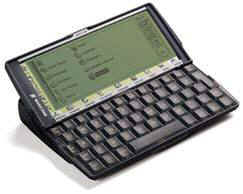What is the difference between www & wap?
By byx2006
@byx2006 (432)
Philippines
5 responses
@oring_srinivasan (32)
• India
5 Jan 07
WAP is the gateway through which we can access internet in the cellphone, you can ready & send email, chat with messenger, browse internet...
@ahsanxr (341)
• Pakistan
5 Jan 07
well the difference between www and wap is that www is meant to be opened at computers but can also be opened at some good mobile phones while wap is only meant to be opened at cell phones but they can also be opened at the pc by using softwares such as opera.
@swarn47 (1706)
• India
5 Jan 07
Wireless Application Protocol gateway) Software that decodes and encodes requests and responses between the smartphone microbrowsers and the Internet. It decodes the encoded WAP requests from the microbrowser and sends the HTTP requests to the Internet or to a local application server. It encodes WML and HDML data returning from the Web for transmission to the microbrowser in the handset.
Source: http://www.answers.com/topic/wap-gateway
World Wide Web) The common host name for a Web server. The "www-dot" prefix on Web addresses is widely used to provide a recognizable way of identifying a Web site. Computers read Web addresses (URLs) from right to left, so that the WWW is the last component of the address.
WWW Is Optional
Today, the WWW prefix is mostly optional. Web sites are typically configured to default to the Web server if only the domain name is used. Try it. Type the name of a Web site into your browser using the http:// prefix and no WWW and dot, and it should work just as well. See dub-dub-dub, World Wide Web, DNS and URL.
Source: http://www.answers.com/www
1 person likes this
@shilpa28k (1737)
• India
5 Jan 07
Mobile world meets cyberspace
Mobile Internet is all about Internet access from mobile devices. Well, it’s true, but the ground realities are different. No doubt Internet has grown fast, well really fast! but mobile Internet is poised to grow even faster. The fundamental difference lies in the fact that whereas academics and scientists started the Internet, the force behind mobile Internet access is the cash-rich mobile phone industry. Mobile industry has always been looking for more avenues to make more money and in this attempt, the mobile industry besides carefully finding about the needs and requirements for a mobile data user is also creating new demand patterns also. What makes things even more favorable for the mobile Internet is that it already has a lot of Internet-based content from which to draw. This can be adapted for display on mobiles in a number of ways. A website can be viewed using a phone that is WAP-enabled.
A mobile is something that we take along with us where ever we go (unlike our computers) and that is one of the reasons many analysts believe that within three years more people will be accessing the Internet from mobile phones than from office or home computers.
Well, a variety of mobile wireless standards exist today, each have different levels of data capabilities. Thanks to the developments taking place in all the 2nd generation mobile wireless data technologies, and the high data speeds being promised by the 3rd generation systems, the distinction between the wireless, wireline and the Internet service providers is beginning to blur. Mobile Internet access surely is poised to be a major commercial success. While the underlying network technologies keep on evolving, what is going to differentiate on network from the other is finally the services that it provides to the end user. Data services provided by the mobile networks are fast becoming popular and in some countries in Europe people are spending more on mobile data access compared to voice services. This presents a huge opportunity for the mobile data service developers.
The issue is that with a range of mobile devices and underlying mobile wireless technologies, developing services specific to each type of equipment and specific to a particular technology is troublesome. An application written for specific equipment and a specific technology won’t work anywhere else. This calls for a standardization, which provides a generic model where applications can be written without keeping in mind the equipment and the technology. On the equipment side, the wireless devices represent the ultimate constrained computing device with:Less powerful CPUs,
Less memory (ROM and RAM)
Restricted power consumption
Smaller displays
Different input devices (e.g., a phone keypad, voice input, etc.)
and on the network side, wireless networks are constrained by
Less bandwidth
More latency
Less connection stability
Less predictable availability
However, most important of all, wireless subscribers have a different set of essential desires and needs than desktop or even laptop Internet users. With the emergence of 3G technologies, the constraint on the low data rates may not be as limiting as it is today but is must be understood clearly that, as bandwidth increases, the handset’s power consumption also increases which further taxes the already limited battery life of a mobile device. Therefore, even as wireless networks improve their ability to deliver higher bandwidth, the power availability at the handset will still limit the effective throughput of data to and from the device. A wireless data solution must be able to overcome these network limitations and still deliver a satisfactory user experience.









